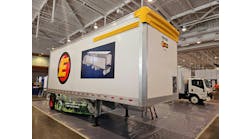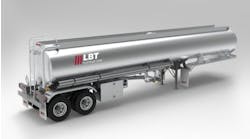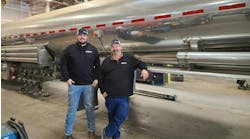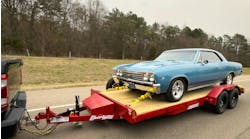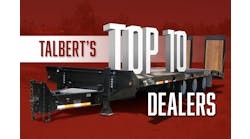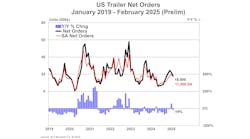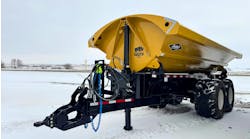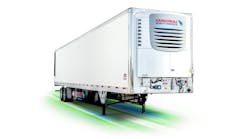When Joshua J. Coster bought Wil-Ro Inc. almost five years ago, he recognized an established, respected brand with significant upside potential. He's spent the time since putting in place people and processes, reassessing product lines, and talking up the brand to anyone and everyone who will listen.
"We're building on a solid foundation—owned by the same person for 44 years, with a reputation for craftsmanship and integrity—so now we can bring a mission to it. And our mission today is certainly to put people before our product; if you have great people, you will be successful,” Coster said, speaking to TBB at Wil-Ro’s Gallatin, Tenn., headquarters and manufacturing facility. “We want to talk about our core values, we want to talk about our pillars of excellence, we want to talk about our mission statement. And then to bring the processes to it and scale-up."
Those values played a big part in Wil-Ro earning a Top Workplaces 2021 honor by the Tennessean. That, and facility renovations; and new safety protocols; and field trips to Chicago for a Cubs game; and paid time off for community projects—all aligned with "demonstrate the Golden Rule," “make manufacturing fun,” “give back,” and “live passionately.”
And, literally bringing those values home, this interview was paused as Coster’s mother then his father-in-law popped into the office with updates on preparations for Wil-Ro's Inaugural Truck Show, a benefit for the Nashville Rescue Mission—just one of the many local causes Wil-Ro actively supports.
Appropriately, the severe storms from the day before didn’t reform as forecast, and the show went on without a hitch.
Innovation and investment
Even before Coster made "innovate and grow" a core value at Wil-Ro, innovation was built into the company. The origins date to 1970, when brothers William and Roger Anderson made their first cattle trailer for a neighbor, then another and another. Wil-Ro, Inc. was then formed in 1973, focusing on manufacturing horse trailers, farming, cattle, and equipment trailers, starting gates for horse racing, and horse walkers. The factory moved to its current location in Gallatin in 1979—and founder Bill Anderson still lives just across the street.
Through the ’90s, Wil-Ro evolved with new products, fabricating truck bodies, dump trailers, roll-off boxes, and landscape bodies before discontinuing livestock trailers altogether. In the 2000s, Wil-Ro launched its Flatbed Series, followed by the Platform Series.
“If you look at our product offering today, we didn't build a single one of those in 1973,” Coster said. “The industry itself is certainly changing with the electrification of vehicles. It's changing with the supply chain and how people have to get creative with running their business. It's an exciting time; every day is a new challenge.”
Indeed, upgrading a manufacturing facility that hadn’t seen major improvements since it was built in 1979 has been quite a challenge for the Wil-Ro team.
“We can put some paint on the wall. We can remodel this, we can update that, we can standardize this—we can really streamline,” Coster said. “When you see the amount of depreciation and amortization happening the first four years, then the amount of investment that went back into the facility to create an environment and an atmosphere people can take pride in, one that’s safe, that's well lit, that's energetic—it was an opportunity to create something special here.”
While Coster has invested more than a million dollars in the facility—ranging from upgrading plant equipment to building a large company break room, exercise room and kitchen—getting SolidWorks 3D CAD software for the engineering department has been critical. Simply, technology was not a prior point of emphasis.
“We weren't even using 3D drawing before the acquisition,” Coster said, then pointing to a massive whiteboard that manages production planning, “visit us a year from now; this will be a touchscreen.”
The manufacturing floor is bright, thanks to 30 new skylights and LED lighting. New Miller welding stations replaced aging equipment, some of which Coster suspects were from the ’70s and kept functional with replacement parts for replacement parts.
The new large break room features an industrial kitchen, where Wil-Ro serves breakfast twice a month. Coster's goal is for Wil-Ro to become profitable enough to provide breakfast and lunch five days a week. Much of the renovation is courtesy of Coster’s father, who sold his manufacturing company several years ago and retired—then came to Tennessee because that’s where his grandkids were.
Along with Wil-Ro branded work clothes, the company provides workers with an allowance for personal safety gear such as steel-toed shoes and prescription safety goggles.
Distribution upgrades
But, no matter how great the people and products are, truck bodies don’t sell themselves.
“Putting together a distribution network has been fun and exciting,” Coster said. “We weren't distributing when I bought Wil-Ro; that wasn't the business model. Half of the sales were going direct-to-consumer and half through established commercial relationships.
“We need all consumers to love the product, of course. But how do we get consumers to buy it through either the commercial dealerships in their regions or through our distribution network, which is upfitters and truck equipment companies that have a need for this product?”
Coster seems to be finding some answers: Last year, Wil-Ro sold products in 38 states. Recently, the company announced a move into the Northeast by adding NY Plow & Truck Body as a distributor partner and a deal to make Chandler Truck Accessories a preferred supplier for toolboxes.
And, again, it’s about people and relationships—as well as product, of course.
“Are there solutions that we can offer that our competitor in that region currently isn't offering? Is there a solution that we offer when the current regional solution falls short of the customer's expectations? Maybe the customer expects a higher quality product, or the quality of products is on par. However, they value a relationship, and they want something long-term and not just transactional," said Coster.
“And this isn't to talk poorly about any competitors, but we have to find our advantage. When we go into these areas, we say, number one, we're not interested in just ramming our products down anyone's throat. We're more interested in understanding: Is there a foundation, some common ground amongst the organizations? I get super excited if I find the core values between the two organizations have some overlap, and someone who has an appreciation for business and longer-term partnerships," added Coster.
Oh, and the Wil-Ro team is on the phone. A lot.
“I believe if we went back and pinpointed every single one of the new relationships, it's all started by phone call,” Coster said. “In the past, Wil-Ro was order takers. So, we've transitioned to a straightforward mindset: if the phone's not ringing, it better be ringing on the other end. Then we’re going to get in the car or on an airplane. We're doing whatever it takes to get in front of people.”
And that includes Coster himself, who—in this COVID-19-limited times—recently drove seven hours into Ohio for a 45-minute meeting.
“When I travel today, I can go to bed at night and have no concerns,” he said. “We have a bench now—we did not have a bench in the past. Wil-Ro is very blessed to have the right leaders in their roles, and they’re also excited and motivated and believe in the mission, supporting the core values and saying ‘we're going to do this.’ I can give very high-level direction and can then travel for a day or two, and they execute.”
Not that any of this is a super-secret formula for success. But the Wil-Ro team also reverse engineers the process, paying close attention to what successful competitors are doing in head-to-head areas.
“They're able to take sales of certain of their products within our market because they have solutions that we haven't come up with yet,” Coster said. “Or they're able to capitalize on areas where we're not the strongest yet. It takes a team and putting your thinking caps on to say, ‘where's the gap?'"
Coster expanded, "Maybe delivery is late, and we can turn it around quicker. Maybe they're not happy with the quality. Maybe they want to have somebody come and visit them every month—every single relationship tends to be a little bit different. We have to be willing to say, 'What can we do to provide the solution?’ and we might not have it in some cases. But we're still small enough that we're nimble, and we can make decisions and pivot on a dime— 'we didn't think about that yet, but we'd love to try to come up with something for you.’”
Additionally, this spring, Wil-Ro finalized a partnership to join the General Motors Fleet Bailment Pool, another means meant to support Wil-Ro's growth into new markets, and the geographic footprint expansion among GM Commercial Dealerships for medium-duty and Low Cab Forward (LCF) needs.
Likewise, the deal facilitates business demands and growth for Wil-Ro's customers, providing them greater chassis and truck body availability through GM bailment pool opportunities.
Ford and RAM also have approached Wil-Ro, although the slowdown in truck production means those plans are on hold for the time being, Coster noted.
Leadership
For the record, at numerous points during the interview and facility tour, Coster emphasized that the story of Wil-Ro since he bought the business isn't about him; it's “a story of the people.”
“I feel like I've had this entrepreneur spirit since I was probably 10, and I got my first paper route,” Coster said. “And I always knew, at some point, I'd love to own a company—you just don't know when, don't know where, and don't know how it's going to happen.”
His resume includes The U.S. Marine Corps right out of high school, multiple honor society memberships at DePaul University, an MBA from Northwestern's Kellogg School of Management, and jobs with Caterpillar, Joy Global, and TransDigm Group.
And at his last stop, with TransDigm’s AdelWiggins Group in Southern California, he was able to bring his skills and experience together and—with significant responsibilities as director of operations for the aerospace manufacturer—broaden his understanding of how to run a business.
“I felt equipped. I wasn't getting any younger,” Coster said. “My wife and I sat down and decided, ‘this is the plan, so let's start looking at it.’”
In mid-2016, Coster began working with a business broker and narrowed the options to a manufacturer in Charlotte, N.C., and Wil-Ro. When the owner in Charlotte changed his mind about selling, the Costers—with three daughters under seven years old—were on the way to Tennessee, settling in Nashville about 30 miles south of the Wil-Ro facility.
Coster insisted he’s still learning about the truck body industry but suggested that product-specific knowledge isn't as important as understanding what it takes to run a successful manufacturing company.
“Do you have experience with the different facets, or the different angles, of owning and operating a business?" he said and used managing the supply chain as a prime example. “I don't know if that could be any more critical today—that’s certainly relevant in 2020 and 2021. And I feel, again, very blessed that there have been a few different steppingstones in my career where I worked on supply chain and logistics, and pricing and negotiating.
“Also, for truck bodies, you need certainly to come into the industry with an appreciation or understanding of manufacturing and operations—metals and processing and fabricating—and an understanding of engineering," added Coster.
But it’s not just a matter of knowing what the company’s departmental structure should look like. It’s about having a vision—a direction—and then being able to execute.
“For a sales department, if the desire is also to grow, then someone with an appetite for growth is great,” Coster said. “But what's the exposure to new business? How do you approach new business? You can't just show up and say, ‘I want to grow a company’ and then not have a specific plan—a course of action.
“Are you putting together an outreach plan? Are you getting out there and telling your story through your website, through social media, through press releases? Are you doing it the old-fashioned way? Which I believe in—by picking up the phone and making phone calls and introducing yourself," said Coster."
Indeed, Coster heard comments about “this crazy guy from California” when he announced his plans to grow the business. Texas seemed to be a great market opportunity to Coster, but the conventional wisdom was: “Wil-Ro is not going to sell in Texas; it never has, and it never will," recalled Coster.
“And it didn't happen on the first phone call,” Coster said. “But that doesn't discourage me. I got on a plane, and right now, one of our top five accounts happens to be in the State of Texas.”
Branding, branding, branding
A quick look at Wil-Ro’s marketing materials—website, product brochures, social media activity—has a look and feel of the materials produced by much larger organizations.
But, again, it goes back to people. Coster recalled that the old website had only one picture of a person, and in the early days of his ownership, he had asked each employee to sit down with him for a chat but never saw the face from the website. It turns out the image was a stock photo.
“So, when we built our site—because the site’s in my head, but I need website designers to execute—I said, if somebody is on our new website and it takes them five minutes to figure out what we do, I'm okay with that,” Coster said, over the objections of website developers. “The new site better scream people, people, people, culture, culture, culture, our brand, our brand, our brand.
“It had better talk about our vision, about our mission, about our energy. And showcase our team, like every one of those people working on it. I didn't want the website to scream trucks, trucks, trucks; I want it to be about the story or what I like to say is ‘the fabric’ that's behind the brand," Coster continued.
(Ironically, someone recently asked Coster where he found the “actors” featured on the website profiles, and, of course, they’re all folks at Wil-Ro.)
Likewise, Wil-Ro’s slick product catalog features a modern design, professional product photos, and heavy paper stock. But, instead of the latest innovative truck body, the opening spread lays out the company’s pillars of excellence, cultural statement, and core values.
While people may be Coster’s top priority, his “passion” is branding.
“I get obsessed with certain brands like Disney, like Nordstrom, like Ritz-Carlton—thinking through organizations that really do things right when it comes to people or customer service or relationships. And that stuff excites me,” he said.
Coster admits it might sound “corny,” but Wil-Ro has a book club that meets weekly to read and discuss business management “and get excited about it.”
“You can tell the individuals who are hungry for more, and want to learn more and who are ready,” he said, noting specifically the rapid advancement of his operations and sales managers. “It’s also mentoring and training them on how to manage without getting stressed out when their plate appears to be overflowing.
“If you're working with them and you’re mentoring, and you're sometimes even pushing them to areas you know they can go to—but they don't know because they doubt themselves. And when that person gets promoted or takes on a new role or at times departs the organization for an even bigger role—that's what really excites me the most in my career—and not just at Wil-Ro: seeing the success of those around you.”
Fresh faces
Along with recruiting efforts at colleges (not only in the Greater Nashville area, but nationally) that have brought in young talent, Coster cited a local young man who started at Wil-Ro in his senior year of high school. He has spent the four years since doing various jobs for the company before working his way onto the supply chain team. He recently began taking a couple of college classes each semester—with Wil-Ro paying tuition.
Wil-Ro also works with the Tennessee College of Applied Technology, which has several area campuses that provide occupational and workforce development training.
“The youngest person in our factory just finished his junior year of high school, and he's working this summer. How many kids want to work in a factory in the middle of summer?” Coster said. “The ones that do, those are the ones that want it. He's rocking it, and he loves welding. He's probably one of six or seven that we've had the last few summers. We weren't doing this prior, but now we're going out into the high schools saying, ‘Who wants to weld? Who wants to learn? Who likes a factory? Let's go.’”
Wil-Ro currently has 62 employees—with several open slots for welders—up from 23 when Coster bought the company. And although Wil-Ro added a second shift in March 2021 and could hire several more welders, the company is in no rush to bring on warm bodies.
“We're getting tighter and tighter with our interview criteria —we want to be selective,” he said. “A lot of that stuff on your application doesn't matter to me. What matters to me is what's on the backside of your application or resume, which is your drive, your work ethic, your energy, your passion; what do you want to do? What will ensure that the smile that's on your face every morning when you're driving to Wil-Ro is still on your face every afternoon when you're headed home?"
“So, if you absolutely are on fire about welding, and you've never welded before, I want you on my team. If you have welded your whole life, and you're a bump on the log, I don't want you on my team," said Coster. "If you hate painting and you're a painter, you can't paint here because that type of attitude is a poison, and that's toxic to our workplace.”
The Wil-Ro team now also looks considerably different than it did four years ago. Along with many younger hires, one in five employees is now female, compared to zero. Thirteen percent are non-Caucasian, again compared to zero previously. Wil-Ro’s certified welder count is up 50%, and 13% are veterans.
Finally, products
As for truck bodies, Wil-Ro continues to adapt and evolve as Coster evaluates the main lines, looking for the best opportunities. Since the acquisition, Coster has established the four basic models and instituted specific variations in each series.
For example, he points to the “quality and craftsmanship” of a Wil-Ro standard landscape truck body as a differentiator, making it a top seller—but “hundreds of guys” are building landscape bodies. The removable dovetail landscape body, however, means only “one or two” competitors.
“I like the removable dovetail truck bed. It's versatile; it's three trucks in one,” Coster said, making it ideal for the landscaper that has a variety of jobs and materials—but it hadn’t been properly marketed previously. With a higher profile, that production ratio is now up by 10X.
But manufacturing efficiency is the big reason for limiting custom builds.
“When I started, we didn't even have them in series; instead, it was just wide open—it was anything you wanted, we would build,” Coster said. “That wreaks havoc in your supply chain, in your engineering, in your training, and your standardization. So, we've tried to get tighter and tighter.”
The reduction in custom work has “upset some relationships,” Coster admitted, but to scale the company, “volume is important”—although “quality always needs to come before quantity.”
Along those lines, in early August, Wil-Ro announced the “temporary pause” of its utility flatbed and western flatbed product lines due to “supply chain delays, volatility of steel market, and its availability.” The aim is to improve the production rate of higher-demand truck bodies and reduce lead times.
Wil-Ro has not abandoned customers looking for customization, however. The company does offer a “fleet solution.”
“If someone's looking at an order of 10 or more truck bodies, we will invest engineering and R&D, and we'll build this for a fleet,” Coster said. “But if you're calling us and just want one, we're not going to be able to do that.”
So, how’s it all working out? At mid-year, Wil-Ro reported a 29% growth rate over 2020, and targets 25% for the year.
The company has plans for a facility expansion later this year.
So far, so good.
